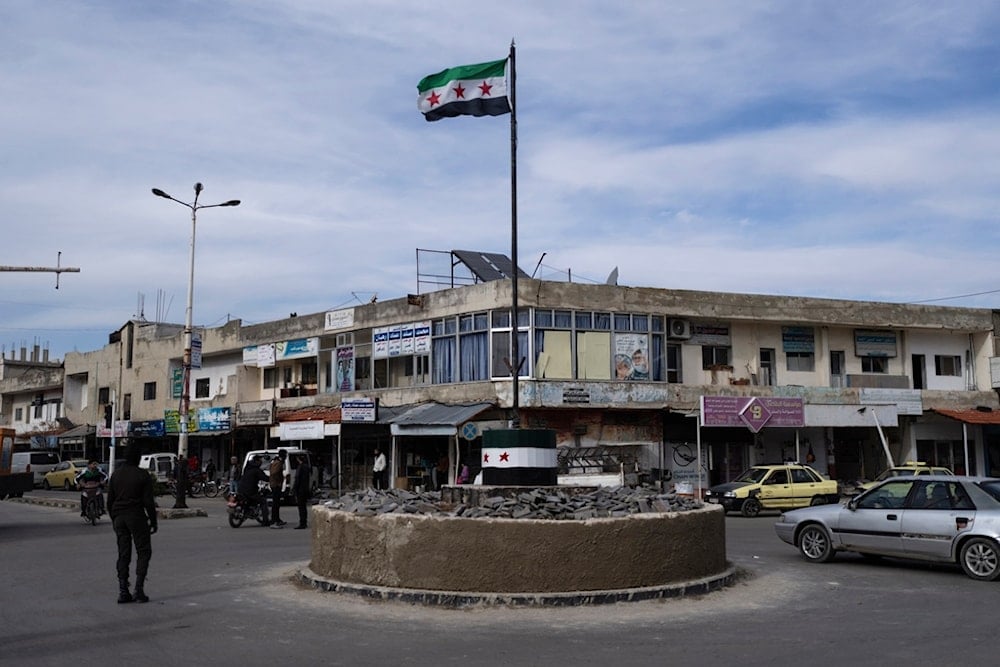Syria set to host dialogue summit amid concerns over representation
The conference was officially announced just two days before its commencement, prompting objections from longtime opposition figures abroad who cited the short notice as a barrier to their participation.
-

Cars drive past a roundabout hoisting the new Syrian flag after the ousting of the al-Assad regime, in Salam City, formerly called Baath City after the ruling party, in Quneitra, Syria, Sunday, Jan. 5, 2025 (AP)
Hundreds of Syrians are set to convene in Damascus on Tuesday for a one-day National Dialogue Conference, which the country’s Islamist rulers have framed as a pivotal step in the transition to a new political system following decades of al-Assad rule, Reuters reported.
However, critics have raised concerns over the rushed preparations, limited minority representation, and the ultimate influence of the summit, given that the political process has so far been dominated by Hay'at Tahrir al-Sham (HTS), the Islamist armed group that seized power after overthrowing former president Bashar al-Assad.
According to the conference’s organizers, discussions will focus on recommendations aimed at shaping a constitutional declaration, which is expected to outline the foundational principles of Syria’s new governance framework. Other key topics include transitional justice, economic reforms, and institutional restructuring.
The conference’s proposals will also be reviewed by a new transitional government, set to assume power in Syria on March 1, according to Hassan al-Dughaim, spokesperson for the preparatory committee.
The event is drawing close scrutiny from Arab and Western capitals, with three diplomatic sources telling Reuters that full normalization with Syria’s new leadership—including the potential lifting of sanctions—will depend on the inclusivity of the political process and whether it adequately represents the country’s ethnic and religious diversity.
To prepare for the conference, a seven-member preparatory committee held listening sessions across Syria’s 14 provinces, sometimes conducting multiple two-hour meetings per day to accommodate all regions within a week.
Notably, five committee members are either affiliated with HTS or closely aligned with the group, and no Druze or Alawite representatives—two significant Syrian minorities—are included. A total of 4,000 people across Syria participated in the invite-only sessions, according to Hassan al-Dughaim, spokesperson for the conference's preparatory committee.
Nonetheless, the lead-up to the conference has drawn criticism, with some viewing it as yet another sign of HTS’ firm grip on Syria’s political process since ousting al-Assad.
In his inaugural address as president on January 30, HTS leader Ahmad al-Sharaa described the dialogue as "a direct platform for discussions, to listen to different points of view on our future political programme."
However, the conference was officially announced just two days before its commencement, prompting objections from longtime opposition figures abroad who cited the short notice as a barrier to their participation.
Additionally, no representatives from the Kurdish-led Autonomous Administration in northeast Syria or the US-backed Syrian Democratic Forces (SDF) were invited, officials from both groups confirmed to Reuters.
At least 24 invitations were extended to figures in the southern province of Suwayda, home to Syria’s Druze minority. However, Sheikh Hikmat al-Hajri, the Druze community’s spiritual leader, expressed discontent, stating, "Until now, we respect all opinions, but we haven't seen the ability to lead the country or shape a state in the correct way."
"We're going along with it, hoping that things will become organized or that something new will happen by the end of the transitional period," he told Reuters.
Al-Hajri and others have called for international involvement to ensure the process leads to the establishment of a civilian state based on the separation of powers and the rule of law.
However, according to two Western diplomats and two UN officials, HTS declined offers from the United Nations to assist in organizing the summit.
Violation of Kurdish national partnership rights
Commenting on the matter, the Syrian Kurdish National Council criticized the National Dialogue Conference, arguing that holding the event on such short notice, with an announcement just one day prior, and marginalizing political and ethnic groups constitutes a violation of the Kurdish people’s right to national partnership.
In a statement, the Council described the invitation process as selective and individualistic, lacking clear standards to ensure a balanced representation of Syria’s political and ethnic components. It further questioned the conference’s credibility and its ability to address key national issues.
The Council emphasized that any genuine national dialogue must be comprehensive and inclusive, without overlooking any segment of Syrian society.
It also affirmed its support for any political process that lays the foundation for rebuilding a new Syria and any effort that facilitates a comprehensive political transition, ending the suffering of Syrians and establishing a decentralized democratic state.
Suwayda Military Council announces its formation
Meanwhile, the Suwayda Military Council has officially launched its operations and unveiled its vision following a military parade held in the southern part of the province. The council asserted that it would be part of the national army of the new Syrian state, which it envisions as a secular and decentralized nation.
Reading the council’s founding statement, defected Syrian army officer Tareq al-Shoufi called on all willing military factions to join its ranks.
Hundreds of armed fighters from Suwayda have already declared their allegiance to the Military Council.
Read more: Syrian People's Will Party chief says national dialogue necessary

 5 Min Read
5 Min Read










